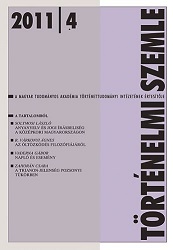Napló és esemény. Gróf Dessewffy József: Testi erkölcsi és társalkodási élet Pesten 1828
Diary and Event. Count József Dessewffy: Moral and Social Life at Pest in 1828
Author(s): Gábor VadernaSubject(s): Local History / Microhistory, 19th Century
Published by: Magyar Tudományos Akadémia Bölcsészettudományi Kutatóközpont Történettudományi Intézet
Summary/Abstract: Count József Dessewffy spent the first months of 1828 at Pest. He was member of the national deputations (as it is termed regnicolaris deputatio) established by the diet of 1825–1827, and took part in the elaboration of the basic rules for the National Casino during his stay at Pest. He was also member of the committee which, commissioned by palatine Joseph, was destined to elaborate the plan of a Hungarian Scientific Society (i.e. the Hungarian Academy of Sciences). Dessewffy recorded the events of these busy days in his travel diary, the manuscript of which can be found in the National Széchényi Library. // The present study explores Dessewffy’s unique perspective as it is exhibited in the diary – the way he organised effective forms of urban living –, and examines the anthropology laying behind the descriptions of events. Since the events of these days were narrated by other memoirs and diaries as well, it is possible to compare the different methods of representation of the same sequence of events by various actors: István Széchenyi devoted his diary to the problems of private life, Miklós Wesselényi mainly took account of the expenses of his journey to Pest, Lajos Bitnicz emphasised the conflicts of interest which emerged from the differences between the confessions, whereas for Ferenc Kazinczy the travel to Pest was an adventure in the world of art.
Journal: Történelmi Szemle
- Issue Year: 2011
- Issue No: 04
- Page Range: 569-589
- Page Count: 21
- Language: Hungarian

